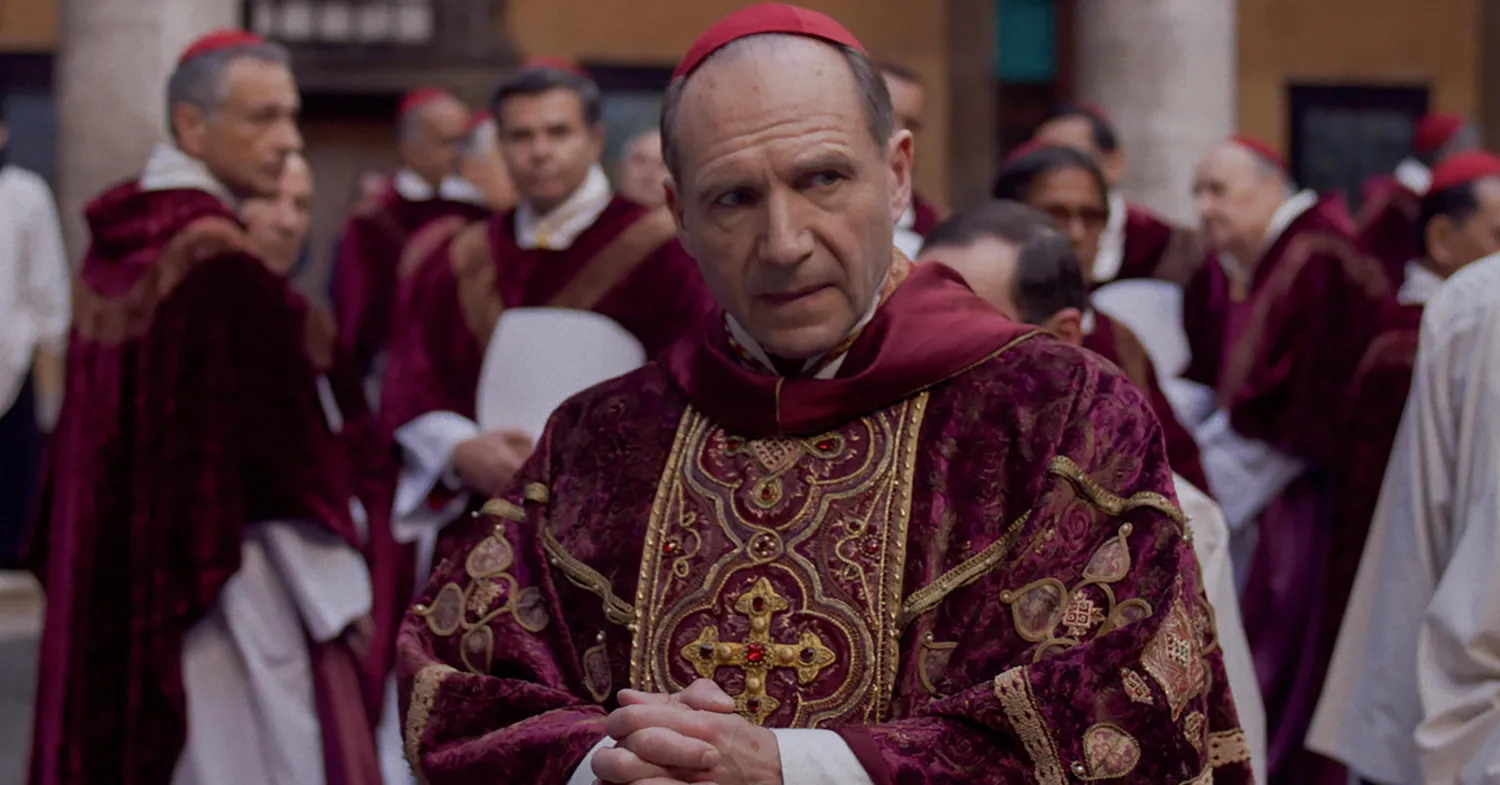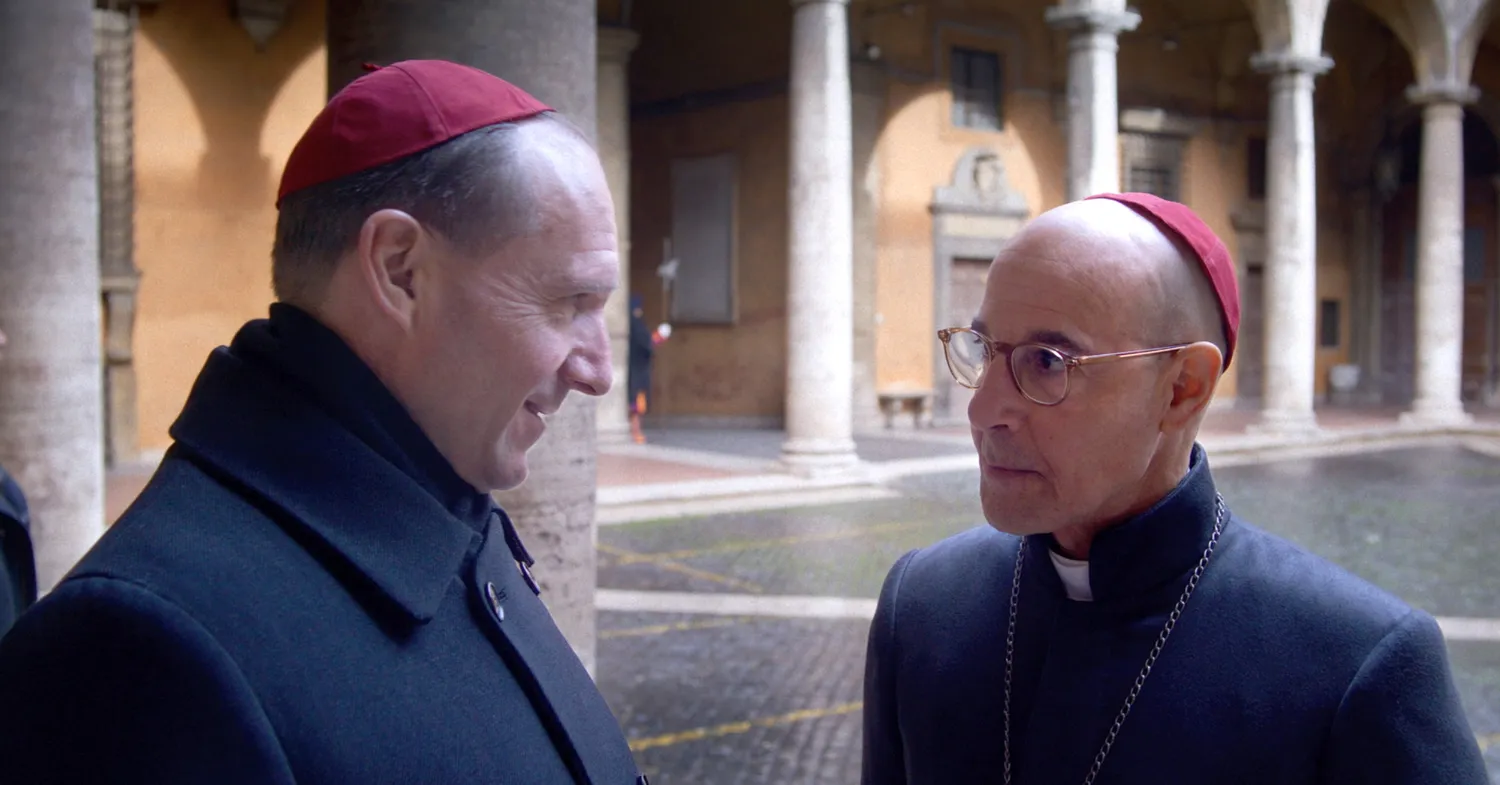Edward Berger‘s adaptation of Conclave is a sometimes riveting exploration of power, faith, and morality wrapped in the framework of a chamber-piece thriller. Following his success with All Quiet on the Western Front, Berger proves his versatility by pivoting from the vast, grim expanses of war to the tightly contained, intrigue-filled corridors of the Catholic Church. His approach maintains a focus on craft, though this time the substance feels more dynamically intertwined with the narrative.

Conclave adapts Robert Harris’s 2016 novel of the same name, capturing the political and theological stakes of the papal election with a level of tension reminiscent of films like Margin Call or Knock at the Cabin. These comparisons highlight the universality of the narrative: a high-stakes decision that will reverberate far beyond the confines of the room in which it is made. Berger uses this structure to peel back the veneer of sanctity and explore the complexities and contradictions of the Church’s leadership, making for a concept that’s as thematically rich as it is dramatically effective.
The film‘s setting—rooted in ritual, secrecy, and centuries-old tradition—provides an atmospheric backdrop that heightens the suspense. By distilling the broader existential questions into intimate moments of negotiation and soul-searching, Berger creates a taut, compelling piece.
The death of the Pope sets the stage in Conclave, as the Catholic Church’s most powerful figures gather to decide its future. Edward Berger’s adaptation skillfully navigates the ideologies, egos, and allegiances within the Church, with Ralph Fiennes (The Grand Budapest Hotel, The Menu) at the helm as Cardinal-Dean Thomas Lawrence. Fiennes embodies the leader whose progressive ideals frequently collide with the entrenched conservatism of his peers. His alliance with Cardinal Bellini (Stanley Tucci) represents a push for change within the institution, creating a fascinating dynamic with their ideological opposites—Cardinals Joseph Tremblay (John Lithgow) and Joshua Adeyemi (Lucian Msamati)—as well as the staunchly traditional Goffredo Tedesco (Sergio Castellitto).
The political maneuvering and power struggles are compounded by the arrival of Vincent Benitez (Carlos Diehz), a Mexican archbishop with a compelling claim: the late Pope secretly elevated him to the rank of cardinal. Benitez’s history of missionary work in war zones positions him as a figure who challenges the conclave’s insular focus and forces the cardinals to reckon with the global implications of their decision.
The interplay between these factions—progressive, conservative, and traditionalist—forms the film’s dramatic core. Through rounds of voting and debates cloaked in tradition, Berger invites viewers to witness not only the theological implications but also the human ambitions, insecurities, and convictions at play in this sacred yet profoundly political process.
Originally positioned as a major contender in the Oscars race, Conclave surprises with its pulpier tone, diverging from the typical prestige fare one might expect. Edward Berger’s sharp direction peels back the veil on the papal conclave, revealing it to be as chaotic and unpredictable as any political election. Despite the solemnity of the Catholic Church’s traditions, the film underscores how these age-old rituals struggle to maintain relevance in the face of modern challenges. The weight of current events and the exposure of internal fractures threaten to unravel a system that relies heavily on mystique and continuity.

At its heart, Conclave also delves into the fragile façade of leadership. Almost every contender for the papacy is met with the unveiling of personal scandals, forcing them to step back from consideration. This element of the story provides a pointed, if somewhat surface-level, commentary on the universal nature of power and accountability. Written in 2016, the novel’s timely reflections on leadership in the shadow of controversy feel less like coincidence and more like a deliberate mirror to contemporary political climates. Berger leans into this with a measured pace that builds tension, but he never lets the film stray too far from its core as a pulpy, engrossing chamber drama that keeps viewers questioning everyone’s motives.
Conclave occupies an intriguing space as both smarmy and airy—a sophisticated yet digestible popcorn flick for adults. It’s the type of film that straddles the line between prestige and mainstream entertainment, offering just enough intrigue to keep the audience engaged without demanding too much introspection. Ralph Fiennes and Stanley Tucci deliver performances that are perfectly serviceable but lack any transformative depth. They’re reliably Fiennes-ish and Tucci-ish, doing exactly what one might expect from them—solid but unsurprising. The film’s understated tone limits opportunities for anyone in the cast to push their performances to memorable heights, creating a consistency that feels safe but not groundbreaking.
The third-act twist, however, is where I felt that Conclave falters. A revelation so abrupt and ungrounded that it feels almost detached from the rest of the story, it lands with little setup or foreshadowing. Twists don’t need to be telegraphed, but they do need to feel earned, and this one doesn’t quite fit the puzzle that’s been constructed. With the reveal coming in the film’s final moments, there’s barely enough time to process its implications, let alone understand how it reshapes the conclave’s ultimate decision or the future of the Church. Berger seems more concerned with avoiding controversy than making a definitive statement, leaving the story to limp to its conclusion just as it teeters on the edge of meaningful commentary. It’s a polished, intriguing watch, but one that shies away from fully committing to its potential impact.
A flawed but undeniably entertaining follow-up to Edward Berger’s All Quiet on the Western Front, Conclave feels like a deliberate departure in tone and ambition. In many ways, it operates as the inverse of its predecessor. While All Quiet on the Western Front leaned heavily into artful craftsmanship, Conclave unabashedly dives into pulpy genre territory. It’s a fascinating pivot for Berger, who seems intent on carving out a space for himself as a director of “artsy genre pictures.”
READ MORE MOVIE REVIEWS: Oh, Canada, Sing Sing, Wicked
Yet, Conclave doesn’t quite hit the mark. Where All Quiet was painstakingly meticulous in its artistry, Conclave revels in its genre conventions to the point of feeling like pure muck. It’s entertaining, yes, but lacks the thematic resonance and balance that might elevate it beyond its crowd-pleasing appeal. Perhaps Berger’s next project will find the sweet spot, blending the two approaches into something that truly sticks—a film that’s as thoughtful as it is engaging.
Score: 6/10
Conclave (2024)
- Cast: Ralph Fiennes, Stanley Tucci, John Lithgow, Isabella Rossellini, Lucian Msamati, Carlos Diehz, Sergio Castellitto
- Director: Edward Berger
- Genre: Drama, Thriller
- Runtime: 120 minutes
- Rated: PG
- Release Date: October 25, 2024